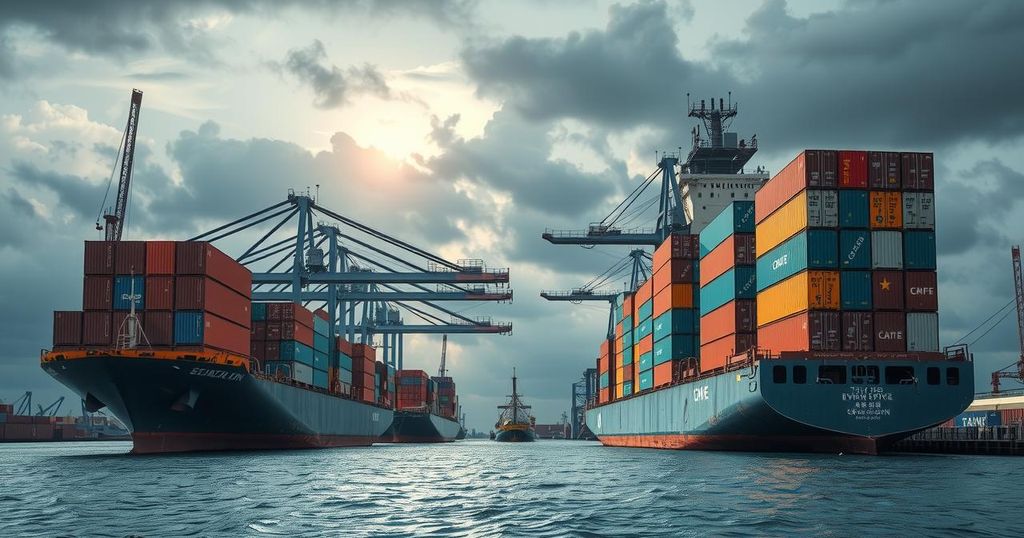Canadian Prime Minister Justin Trudeau and Mexican President Claudia Sheinbaum have responded to President Trump’s executive order imposing up to 25% tariffs on their exports. Trudeau announced retaliatory tariffs affecting C$155 billion worth of U.S. goods, warning of rising consumer prices. Sheinbaum urged dignified negotiations amid escalating tensions, while China planned to file a complaint with the WTO. Trump cited national security concerns in justifying the tariffs, which critics warn may burden American consumers and economies.
The leaders of Canada and Mexico have firmly responded to President Donald Trump’s recent executive order imposing tariffs of up to 25% on their exports to the United States. Prime Minister Justin Trudeau of Canada announced retaliatory measures, including a phased-in 25% tariff on approximately C$155 billion worth of American goods. He emphasized that the new tariffs could jeopardize American jobs and increase prices for consumers.
Trudeau highlighted the potential negative impact on U.S. industries that rely on essential Canadian resources such as oil, timber, and critical minerals. He criticized the tariffs as a violation of the USMCA trade agreement established under Trump’s administration, encouraging Canadians to patronize domestic products in light of the tariffs. Measures announced included removing American liquor from provincial stores and targeting various U.S. goods, including alcohol, clothing, and home appliances.
Mexican President Claudia Sheinbaum also condemned Trump’s tariffs, tasking her economy minister with formulating a response while advocating for dignified negotiations. As tension escalates, Sheinbaum made it clear that Mexico will stand its ground and engage in discussions with the U.S. from a position of strength. She rejected accusations of collusion with criminal organizations and emphasized the necessity for productive cooperation.
In addition to Canada and Mexico, China expressed intentions to lodge a complaint with the World Trade Organization (WTO) against the U.S. tariffs, citing violations of international trade rules. The Chinese government called for constructive dialogue to address issues rather than resort to tariff impositions. With these developments, the ongoing tensions suggest the potential for a trade war among these leading trade partners.
Trump justified the tariffs by citing national security concerns and issues regarding illegal immigration and drug trafficking, particularly in relation to Canadian and Mexican exports. He insisted his duty as president is to ensure the safety of American citizens. Critics, including various U.S. legislators, warn that these tariffs will ultimately burden American consumers with increased prices, significantly affecting their daily expenditures.
Economists have urged caution, indicating that prolonged tariffs could adversely impact economies, especially for Mexico, where export activity constitutes a significant portion of GDP. The American Chamber of Commerce in Mexico warned that retaliatory tariffs will not effectively address core challenges related to security and migration. As the situation evolves, stakeholders on both sides of the border await the repercussions of this trade dispute.
The article centers on recent actions taken by President Trump to impose substantial tariffs on imports from Canada and Mexico, as well as reactions from those countries. The trade tensions arise amidst a backdrop of ongoing concerns regarding illegal drugs and immigration, with Trump asserting a link between tariffs and national security. Both Canada and Mexico have voiced their opposition to the tariffs, pledging retaliatory measures, which could escalate into a broader trade conflict.
In conclusion, the implementation of tariffs by President Trump has ignited strong reactions from Canada and Mexico, highlighting the fragility of trade relations in North America. Both nations are preparing to retaliate against American imports, suggesting a cycle of trade barriers that could disrupt economies. The ensuing debate over the impact of these tariffs on American consumers and industries underscores the complexity of trade policy, urging reconsideration amidst rising tensions.
Original Source: www.theguardian.com




